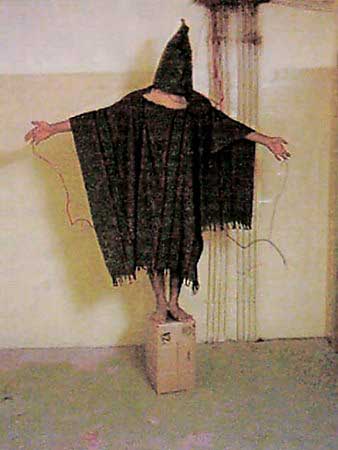
That the US tortures, routinely and systematically, while prosecuting its "war on terror" can no longer be seriously disputed. The Detainee Abuse and Accountability Project (DAA), a coalition of academics and human-rights groups, has documented the abuse or killing of 460 inmates of US military prisons in Afghanistan, Iraq and at Guantánamo Bay. This, it says, is necessarily a conservative figure: many cases will remain unrecorded. The prisoners were beaten, raped, forced to abuse themselves, forced to maintain "stress positions", and subjected to prolonged sleep deprivation and mock executions. Alfred McCoy, professor of history at the University of Wisconsin-Madison, argues that the photographs released from the Abu Ghraib prison in Iraq reflect standard CIA torture techniques: "stress positions, sensory deprivation, and sexual humiliation". The famous picture of the hooded man standing on a box, with wires attached to his fingers, shows two of these techniques being used at once. Unable to see, he has no idea how much time has passed or what might be coming next. He stands in a classic stress position - maintained for several hours, it causes excruciating pain. He appears to have been told that if he drops his arms he will be electrocuted. What went wrong at Abu Ghraib is that someone took photos. Everything else was done by the book.
Routine and systematic torture is at the heart of America's war on terror
Routine and systematic torture is at the heart of America's war on terror
In the fight against cruelty, barbarism and extremism, America has embraced the very evils it claims to confront
George Monbiot
Tuesday December 12, 2006
The Guardian
After thousands of years of practice, you might have imagined that every possible means of inflicting pain had already been devised. But you should never underestimate the human capacity for invention. United States interrogators, we now discover, have found a new way of destroying a human being.
Last week, defence lawyers acting for José Padilla, a US citizen detained as an "enemy combatant", released a video showing a mission fraught with deadly risk - taking him to the prison dentist. A group of masked guards in riot gear shackled his legs and hands, blindfolded him with black-out goggles and shut off his hearing with headphones, then marched him down the prison corridor.
Is Padilla really that dangerous? Far from it: his warders describe him as so docile and inactive that he could be mistaken for "a piece of furniture". The purpose of these measures appeared to be to sustain the regime under which he had lived for more than three years: total sensory deprivation. He had been kept in a blacked-out cell, unable to see or hear anything beyond it. Most importantly, he had had no human contact, except for being bounced off the walls from time to time by his interrogators. As a result, he appears to have lost his mind. I don't mean this metaphorically. I mean that his mind is no longer there.
The forensic psychiatrist who examined him says that he "does not appreciate the nature and consequences of the proceedings against him, is unable to render assistance to counsel, and has impairments in reasoning as the result of a mental illness, ie, post-traumatic stress disorder, complicated by the neuropsychiatric effects of prolonged isolation". José Padilla appears to have been lobotomised: not medically, but socially.
If this was an attempt to extract information, it was ineffective: the authorities held him without charge for three and half years. Then, threatened by a supreme court ruling, they suddenly dropped their claims that he was trying to detonate a dirty bomb. They have now charged him with some vague and lesser offences to do with support for terrorism. He is unlikely to be the only person subjected to this regime. Another "enemy combatant", Ali al-Marri, claims to have been subject to the same total isolation and sensory deprivation, in the same naval prison in South Carolina. God knows what is being done to people who have disappeared into the CIA's foreign oubliettes.
That the US tortures, routinely and systematically, while prosecuting its "war on terror" can no longer be seriously disputed. The Detainee Abuse and Accountability Project (DAA), a coalition of academics and human-rights groups, has documented the abuse or killing of 460 inmates of US military prisons in Afghanistan, Iraq and at Guantánamo Bay. This, it says, is necessarily a conservative figure: many cases will remain unrecorded. The prisoners were beaten, raped, forced to abuse themselves, forced to maintain "stress positions", and subjected to prolonged sleep deprivation and mock executions.
The New York Times reports that prisoners held by the US military at Bagram airbase in Afghanistan were made to stand for up to 13 days with their hands chained to the ceiling, naked, hooded and unable to sleep. The Washington Post alleges that prisoners at the same airbase were "commonly blindfolded and thrown into walls, bound in painful positions, subjected to loud noises and deprived of sleep" while kept, like Padilla and the arrivals at Guantánamo, "in black hoods or spray-painted goggles".
Alfred McCoy, professor of history at the University of Wisconsin-Madison, argues that the photographs released from the Abu Ghraib prison in Iraq reflect standard CIA torture techniques: "stress positions, sensory deprivation, and sexual humiliation". The famous picture of the hooded man standing on a box, with wires attached to his fingers, shows two of these techniques being used at once. Unable to see, he has no idea how much time has passed or what might be coming next. He stands in a classic stress position - maintained for several hours, it causes excruciating pain. He appears to have been told that if he drops his arms he will be electrocuted. What went wrong at Abu Ghraib is that someone took photos. Everything else was done by the book.
Neither the military nor the civilian authorities have broken much sweat in investigating these crimes. A few very small fish have been imprisoned; a few others have been fined or reduced in rank; in most cases the authorities have either failed to investigate or failed to prosecute. The DAA points out that no officer has yet been held to account for torture practised by his subordinates. US torturers appear to enjoy impunity, until they are stupid enough to take pictures of each other.
But Padilla's treatment also reflects another glorious American tradition: solitary confinement. Some 25,000 US prisoners are currently held in isolation - a punishment only rarely used in other democracies. In some places, like the federal prison in Florence, Colorado, they are kept in sound-proofed cells and might scarcely see another human being for years on end. They may touch or be touched by no one. Some people have been kept in solitary confinement in the US for more than 20 years.
At Pelican Bay in California, where 1,200 people are held in the isolation wing, inmates are confined to tiny cells for 22 and a half hours a day, then released into an "exercise yard" for "recreation". The yard consists of a concrete well about 3.5 metres in length with walls 6 metres high and a metal grille across the sky. The recreation consists of pacing back and forth, alone.
The results are much as you would expect. As National Public Radio reveals, more than 10% of the isolation prisoners at Pelican Bay are now in the psychiatric ward, and there's a waiting list. Prisoners in solitary confinement, according to Dr Henry Weinstein, a psychiatrist who studies them, suffer from "memory loss to severe anxiety to hallucinations to delusions ... under the severest cases of sensory deprivation, people go crazy." People who went in bad and dangerous come out mad as well. The only two studies conducted so far - in Texas and Washington state - both show that the recidivism rates for prisoners held in solitary confinement are worse than for those who were allowed to mix with other prisoners. If we were to judge the US by its penal policies, we would perceive a strange beast: a Christian society that believes in neither forgiveness nor redemption.
From this delightful experiment, US interrogators appear to have extracted a useful lesson: if you want to erase a man's mind, deprive him of contact with the rest of the world. This has nothing to do with obtaining information: torture of all kinds - physical or mental - produces the result that people will say anything to make it end. It is about power, and the thrilling discovery that in the right conditions one man's power over another is unlimited. It is an indulgence which turns its perpetrators into everything they claim to be confronting.
President Bush maintains that he is fighting a war against threats to the "values of civilised nations": terror, cruelty, barbarism and extremism. He asked his nation's interrogators to discover where these evils are hidden. They should congratulate themselves. They appear to have succeeded.


















